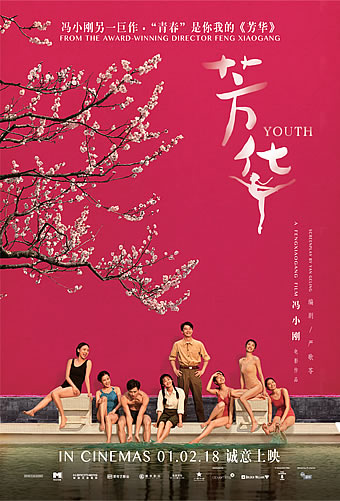YOUTH (芳华) (2017)
Genre: Drama
Director: Feng Xiaogang
Cast: Huang Xuan, Miao Miao, Zhang Chuxi, Yang Caiyu, Li Xiaofeng, Wang Tiancheng, Sui Yuan, Zhao Lixin
Runtime: 2 hrs 16 mins
Rating: NC-16 (Violence and Coarse Language)
Released By: Golden Village Pictures, Clover Films
Official Website:
Opening Day: 1 February 2018
Synopsis: HE XIAOPING faces discrimination because of a family scandal. She hopes to start over in a new place, but finds that the shame has followed her to Chengdu. LIU FENG is well-liked within the group but he has unrequited crush on the lead solo LIN DINGDING. Liu Feng experiences the pain of rejection and is expelled from the group when he makes an unwelcomed advance on her. He Xiaoping is heartbroken because she had secret feelings for Liu Feng… Each of the members of the art troupe all learn lessons in this coming-of-age story. Their paths have led to different places and different experiences.
Movie Review:
By placing Youth in the timeline of the Cultural Revolution, it’s inevitable some pundits will expect a form of commentary or advocacy from the film, especially when it’s from a Mainland Chinese director. From the cushy seat of a critic, one should think nothing of asking a native director to turn entertainment into mouthpiece against their country’s “oppression”.
But then, they shouldn’t.
Feng Xiaogang has built up acclaim across the board, receiving respect and commercial success through his measured way of making movies. For a foreign agent to fault this as a toothless social piece, It’s like asking Michael Bay to be Michael Moore.
Because Youth is really a fine film. A coming-of-age tale rife with tempestuous events that deal with hopes, desires, and ultimately, rejection. Yes, it does wring the sentimentality rag a little much at times, leaving the audience feeling overworked with tropes, but the easy pace of the film softens the aches, and keeps the intimidating 146-minute running time doable.
A new recruit has joined the Peoplés Liberation Party. Her name, He Xiaoping (Mian Mian). With her father a counter-revolutionary, she is eager to prove herself in the military art troupe to see her father’s eventual release. But enthusiasm can often be subject to ridicule.
Other than the exemplary male dancer Liu Feng (Huang Xuan), the rest of the troop makes fun of her boorish upbringing, childishly citing body odour and fake boobs as reasons for her outcast. The clique is headed by the obnoxious Hao Shuwen (Li Xiaofeng), who’s father is in a high-ranking cadres, and includes wilful Lin Dingding (Yang Caiyu) who gets by on her looks.
All this is narrated by Xiao Suizi (Zhong Chuxi), who’s a little bit more sympathetic, and if not, also a little curious as to the reason behind Xiaoping’s inexhaustible determination.
Of course, it’s all very sentimental.
Youth is quite the saga, moving from Mao era to dissolution, to the Reform times; pulling the ensemble apart from their original goals, of which personal and party often misalign. And maybe that is where the message is tucked into. The periods fall around like characters as a backdrop, but the developments have little to do with it - the reminder that there is a disconnect between authority and the people.
But Youth’s greatest asset has to be its cinematography. Luo Pan’s camera work is faultless and effortless. It floats past dancers and snakes pasts soldiers, in long takes that is as alluring as it is compelling. As the dancers finally lose their troupe, so too does the camera stop its footwork, anchoring itself like reality’s grim stamp.
There’s a particular shade of red that is immediately evocative, yet transcendent in symbolism. The Communist red is also seen in blood, furniture, flag and flowers, and though they all symbolise passion, they are also transient - another badge of youth’s quality.
Drenched in golden lighting and shining beads of perspiration and tears, Youth is quietly (and surprisingly) a sensual piece as well. The lithe bodies of the dancers are unmistakably provocative, yet never in a leery manner, even when the slow-mo vignettes of locker room and swimming pool languidly strolls past the screen.
Half of what makes a melodrama a success is its music, and Zhao Lin has scored the film lavishly, befitting the dramatic eras. From luxurious strings to trotting anthems, the music accompanies the film like an expert dancing partner, to explore the themes of Youth - of dreams, regrets and what may come.
Movie Rating:




(An opulent production with stunning technical values, accompanied by a more typical coming-of-age story set in trying times)
Review by Morgan Awyong
You might also like:


-16july2015.jpg)
.jpg)

